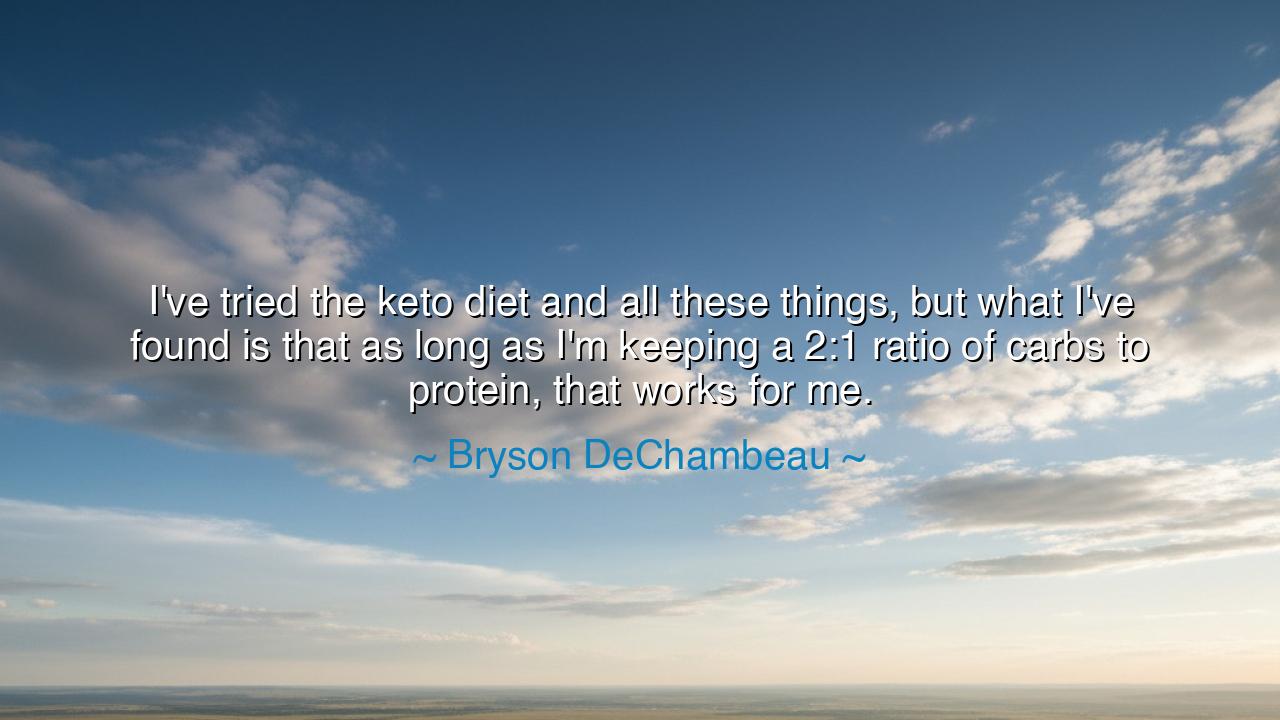
I've tried the keto diet and all these things, but what I've
I've tried the keto diet and all these things, but what I've found is that as long as I'm keeping a 2:1 ratio of carbs to protein, that works for me.






In the words of Bryson DeChambeau, “I’ve tried the keto diet and all these things, but what I’ve found is that as long as I’m keeping a 2:1 ratio of carbs to protein, that works for me,” there lies not only the reflection of an athlete’s experimentation, but the echo of an ancient truth—the search for balance. Beneath the simplicity of his words is a profound realization: that the path to mastery, whether of the body or the spirit, is not found in blind imitation of others, but in the discovery of one’s own equilibrium. In this statement, DeChambeau becomes not merely a golfer seeking performance, but a philosopher in pursuit of harmony—the eternal middle way that has guided sages, warriors, and thinkers throughout time.
To say, “I’ve tried the keto diet and all these things,” is to admit that one has walked the maze of modern temptation: the endless parade of trends and doctrines promising perfection. But as the ancients knew, truth cannot be found in extremes. The Stoics taught that virtue lies in moderation, and the Buddha discovered enlightenment only after abandoning both indulgence and self-denial. So too does DeChambeau’s journey reflect that timeless rhythm of discovery. In trying and failing, he came to recognize that wisdom is not in rigid adherence to dogma, but in understanding one’s own nature—in listening to the body as one listens to the voice of the soul.
The key to his realization is found in the phrase “a 2:1 ratio of carbs to protein.” This is not merely a formula—it is a symbol of proportion, of balance restored. Carbohydrates, the fuel of energy and motion, represent the fire of vitality; protein, the builder of muscle and structure, represents the foundation of strength. In maintaining this ratio, DeChambeau speaks to a truth known to the ancient healers: that the body, like the cosmos, thrives when its elements are held in right relation. Too much fire, and the body burns out; too much structure, and it hardens into stagnation. But when energy and endurance coexist in harmony, the result is sustainable power, the kind that endures through time.
Consider the legend of Milo of Croton, the ancient Greek athlete famed for his incredible strength. Milo grew mighty not by excess or deprivation, but by gradual, measured increase—by carrying a calf each day until it became a bull. His training mirrored the law of balance: consistency over extremity, discipline over obsession. Like Milo, DeChambeau’s insight teaches that the body responds best to harmony, not chaos. His “2:1 ratio” becomes, in essence, a modern expression of an ancient principle: that greatness is sustained not by reckless striving, but by order, wisdom, and rhythm.
Yet, there is humility in his words—a quiet acknowledgment that the path of self-knowledge is one of trial and error. He does not claim mastery over all, but understanding over self. The ancients revered such humility. The philosopher Socrates, when asked why he was considered wise, replied, “I know that I know nothing.” So too does DeChambeau’s statement carry this modest truth: that each person’s balance is their own to find, that wisdom begins when one ceases to chase universals and begins to listen inwardly.
This lesson, though born in the realm of nutrition, reaches far beyond the body. It speaks to the essence of living well: the constant pursuit of personal equilibrium in all things—between work and rest, ambition and gratitude, giving and receiving. The one who finds his balance, like DeChambeau with his 2:1 ratio, stands unshaken amid the storms of change. The one who understands that no single rule fits all learns to live in harmony with both nature and self. The great philosopher Confucius said, “The superior man stands in the middle, but does not waver.” It is this middle ground that DeChambeau discovered—not through theory, but through practice, patience, and honest observation.
Let this be the teaching passed down: seek your own balance. Experiment as the wise do, but do not become enslaved to the fashions of the age. Listen to your body, for it speaks the same truth that nature whispers to the mountains and the sea—that life thrives in proportion. Eat not in extremes, train not in frenzy, and live not in haste. Let your strength be steady, your energy pure, and your wisdom tempered by experience.
Thus, the wisdom of Bryson DeChambeau is not the wisdom of numbers alone, but of understanding and moderation. His 2:1 ratio is a symbol of the eternal law of balance—the harmony that governs the stars, the seasons, and the beating of the human heart. The ancients would have recognized it as the secret of endurance: that to live in balance is to live in strength, and to live in strength is to live in peace.






AAdministratorAdministrator
Welcome, honored guests. Please leave a comment, we will respond soon